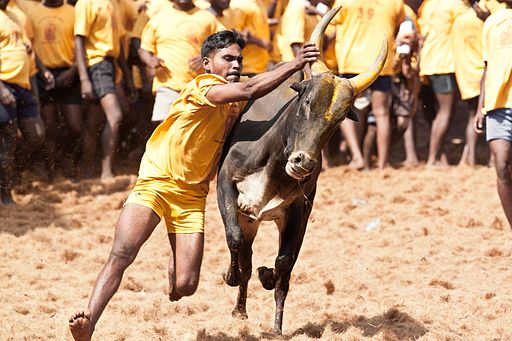
Like Spain, Portugal and France, India has its own bull taming-game called Jallikattu, which has become a controversial topic in the country as many people agree to disagree on the recent ban on the game.
About Jallikattu
Jallikattu is one of the native sports of India's Southern state of Tamil Nadu and played during Pongal (Tamil harvest festival) celebrations. As a part of the game, villagers have to tame the bull, which is an indigenous breed locally called the temple bull and retrieve the gold and silver coins that are tied to the bulls' horns. After the game, while the tamed bulls are used for agriculture and domestic purposes, the wilder ones are used to breed cows as it is believed that the strong traits will pass on to the next progenies.
Ban on the game and subsequent protests
However, in May 2014, the Supreme Court of India banned the practice saying that animal rights are being violated. This led to wide protests in Tamil Nadu as people argue that the bull is not killed, unlike the European bull fighting games. Moreover, they say that Jallikattu is an age old tradition and the indigenous species of bull will go extinct if the game is stopped.
Local people are supported by many public figures like actors and musicians. While Tamil actor Kamal Hassan said he is a big fan of the game and the tradition should not be confused with bull fighting, musician Hiphop Tamizha came up with a song to spread awareness about how the native cattle breed is disappearing.
"If you want a ban on jallikattu, let's also ban biryani," said Kamal Hassan according to India Today.
Why it should be banned
On the other hand, People for the Ethical Treatment of Animals (PETA) is spearheading the movement to ban the sport. According to a report by News18, PETA India Chief Executive Officer Poorva Joshipura slammed the ministry of environment, forests and climate change in 2016 for allowing events like Jallikattu and bull races.
"Our phones have been ringing off the hook this morning with calls from BJP supporters and others who are horrified that the same authorities who claim to care about cattle are now allowing the cruelty to cattle that was already banned by the highest court of India. The use of bulls in performances was banned by the Environment Ministry itself in 2011, and the causing of suffering that is inherent in Jallikattu, bull races and bull fights has been illegal since 1960 under the Prevention of Cruelty to Animals Act. This U-turn is being seen by many of the BJP's own supporters as reckless, heartless, and weak. We vow to take our fight to protect bulls from cruelty back to the Supreme Court," said Joshipura, according to the news website.
PETA believes that bulls are often tortured in the name of tradition. The fact that the bull is not killed does not reduce its suffering in any way. PETA has come up with documented video where the bulls are seen being tortured. The bulls are often made disoriented by feeding it alcohol. During the game, players often twist their tails and are bitten. They are sometimes also stabbed and jabbed by sickles, spears, knives or sticks. Several pictures and videos show that the bulls are punched, jumped on and dragged to the ground. The game continues until one bull manages to flee.
Here is a video by PETA which shows the cruelty the bulls have to endure.
On 9 January, Tamil Nadu Chief Minister O Paneerselvam wrote a letter to Prime Minister Narendra Modi requesting him to lift the ban from the sport for pongal 2017. "Considering the groundswell of sentiment and support for the conduct of jallikattu all over Tamil Nadu, this is an issue on which the Government of India must act with maximum despatch," said Paneerselvam, according to the media.









